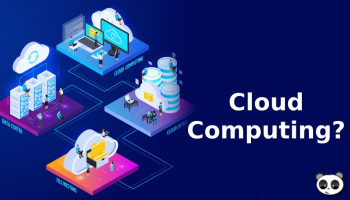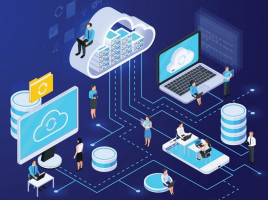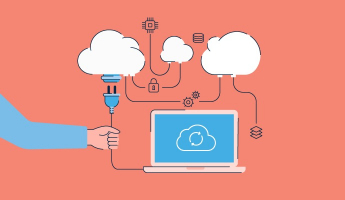Top 10 Largest Cloud Computing Companies in the US by Revenue
Due to factors including rising home office use (due to COVID) and improvements in mobile networking, cloud utilization is on the rise. Thankfully, a wide ... read more...range of computing businesses is available to support the expanding need. Here are some of the Largest Cloud Computing Companies in the US by Revenue.
-
Amazon Web Services, Inc. (AWS) is an Amazon subsidiary that provides cloud computing platforms and APIs to consumers, businesses, and governments on a metered, pay-as-you-go basis. This is frequently used in conjunction with autoscaling by clients (a process that allows a client to use more computing in times of high application usage and then scale down to reduce costs when there is less traffic).
These cloud computing web services offer a wide range of networking, computation, storage, middleware, IOT, and other processing capabilities, as well as software tools, via AWS server farms.
Customers can access AWS services via a worldwide network of Amazon server farms. Fees are calculated based on consumption (a "pay-as-you-go" model), hardware, operating system, software, or networking characteristics chosen by the subscriber, as well as availability, redundancy, security, and service options.
Subscribers can buy a single virtual AWS machine, a dedicated physical computer, or a combination of the two. Certain aspects of security are provided by Amazon to customers (for example, physical security of data centers), while other aspects of security are the responsibility of the subscriber (e.g., account management, vulnerability scanning, patching). AWS operates from multiple locations around the world, including seven in North America.
Founded: 2006
Headquarters: Seattle, Washington, U.S.Official website: https://aws.amazon.com/
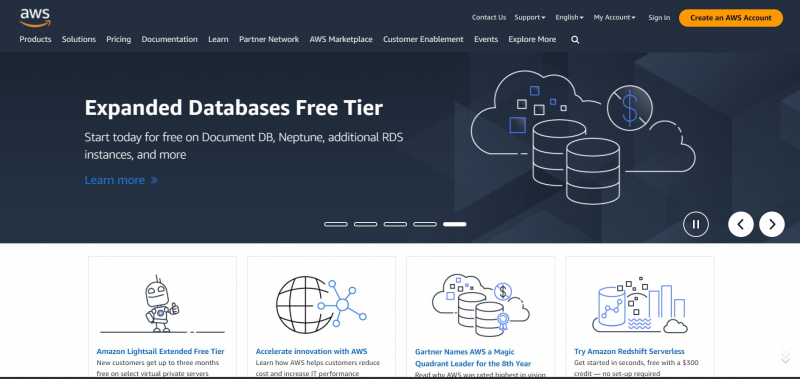
Screenshot via aws.amazon.com 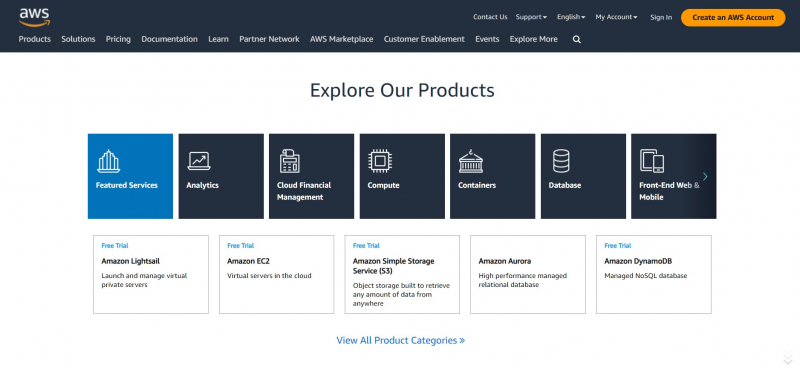
Screenshot via aws.amazon.com -
Microsoft is a worldwide provider of cloud computing services for businesses. Microsoft Azure, also known as Azure, is a cloud computing platform run by Microsoft that allows users to access, manage, and develop applications and services through globally distributed data centers. Microsoft Azure is ranked second in terms of revenue among the UK's largest cloud computing companies.
It provides a variety of services, including software as a service (SaaS), platform as a service (PaaS), and infrastructure as a service (IaaS). Furthermore, it supports a wide range of programming languages, tools, and frameworks, as well as Microsoft-specific and third-party software and systems.
In 2018, Azure was available in 54 locations, with 12 new regions added. Microsoft Azure's revenue for 2022 is predicted to surge as cloud computing becomes more widespread in organizations as a result of its success in supplying trustworthy cloud computing resources at a reasonable price. Companies all around the world benefit from its high-performance cloud infrastructure, which improves scalability and security while allowing them to focus on what really matters: giving value to their customers.
Founded: 2008
Headquarters: Redmond, USOfficial website: https://azure.microsoft.com/
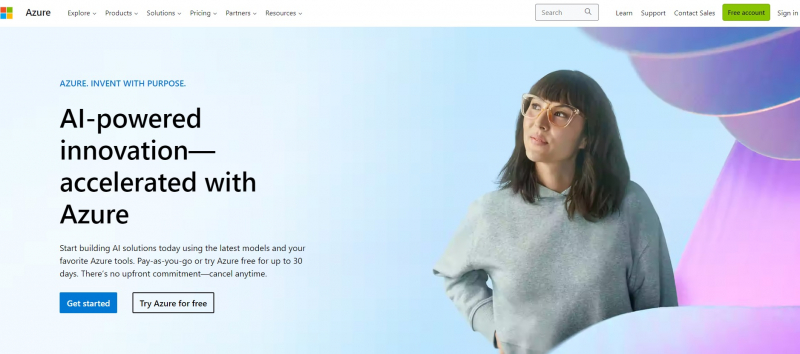
Screenshot via azure.microsoft.com 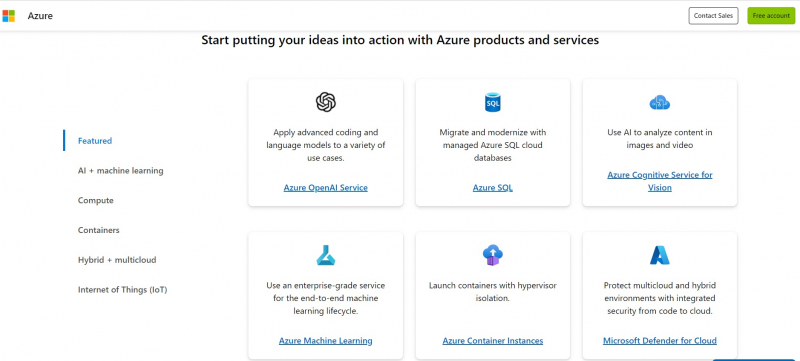
Screenshot via azure.microsoft.com -
Oracle Cloud is a cloud-based computing administration offered by Oracle Corporation. Oracle Cloud Infrastructure, based in London, offers a comprehensive range of cloud services to assist businesses in improving the efficiency and cost-effectiveness of their operations.
Since its establishment in 2008, Oracle has been at the forefront of cloud technology. It is still an industry leader today, owing to its comprehensive array of cloud technologies, which includes public clouds like Amazon Web Services and private clouds like the Oracle Private Cloud Appliance (PCA).
Oracle's cloud architecture incorporates both IaaS and PaaS models for maximum freedom when it comes to putting apps or services on their platform. Furthermore, with revenue forecast to top £5 billion in 2022, it is clear that Oracle Cloud Infrastructure is well-positioned to remain a leader in the cloud computing sector.Their extensive portfolio of cloud services includes everything from cloud storage and database management solutions to cloud monitoring and analytics, making them a perfect partner for enterprises of any size looking to optimize their operational processes.
Founded: 2016
Headquarters: Austin, Texas, US
Official website: https://www.oracle.com/cloud
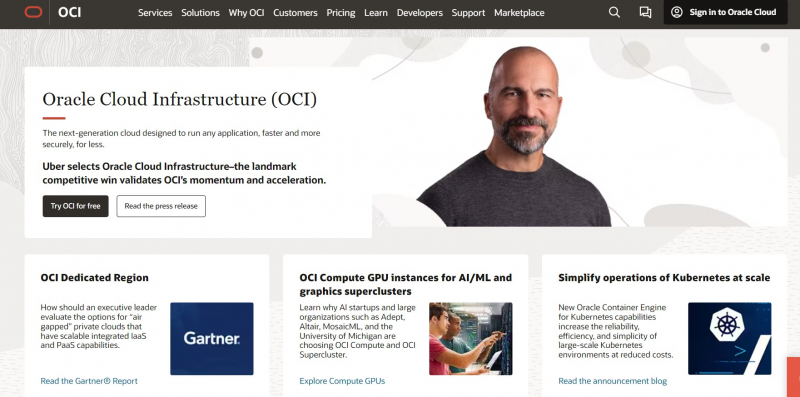
Screenshot via oracle.com 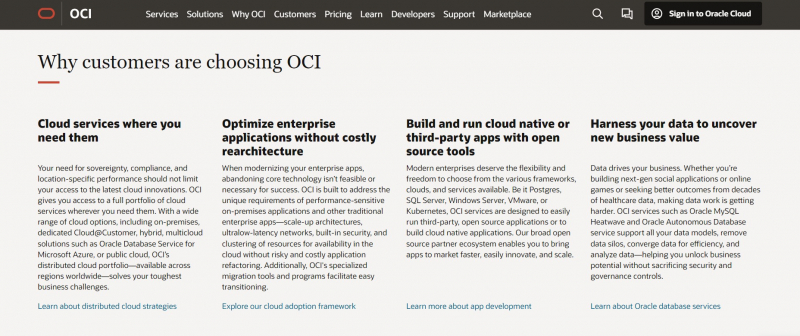
Screenshot via oracle.com -
Salesforce, Inc. is a cloud computing software company headquartered in San Francisco, California. It provides CRM software and apps for sales, customer service, marketing automation, e-commerce, analytics, and application development. Salesforce was formed by former Oracle executive Marc Benioff and quickly grew to become one of the world's most powerful organizations, going public in 2004.
Salesforce's continued growth positions it to become the first cloud computing business to reach $1 billion in annual sales by the end of the 2009 fiscal year and the world's largest enterprise software provider by 2022.
Salesforce is one of the most popular CRM solutions available today. Salesforce enables you, among other things, to manage customer relationships, automate processes, integrate data sources, build custom applications, leverage artificial intelligence, optimize marketing campaigns, create insightful dashboards, visualize real-time insights, build mobile apps, and extend customer service capabilities. All of this makes Salesforce an ideal choice for businesses looking to ensure the smooth operation of their operations.
Founded: 1999
Headquarters: California, USOfficial website: http://salesforce.com/
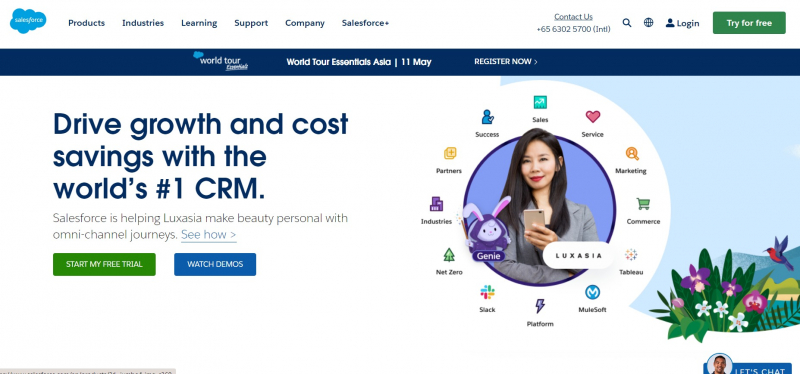
Screenshot via salesforce.com 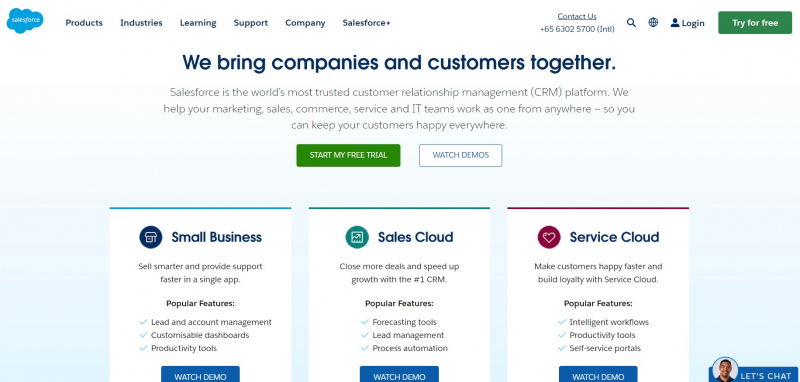
Screenshot via salesforce.com -
Google Cloud Platform ranks fifth on the list of the largest cloud computing companies in the US by revenue. GCP is a set of cloud computing services offered by Google. It runs on the same infrastructure that Google uses internally for its end-user products such as Google Search, Gmail, Google Drive, and YouTube.
It provides a variety of modular cloud services, including computing, data storage, data analytics, and machine learning, along with a set of management tools. Registration requires the use of a credit card or a bank account number.
Google Cloud Platform is a subset of Google Cloud, which also offers Google Workspace (G Suite), enterprise versions of Android and ChromeOS, and application programming interfaces (APIs) for machine learning and enterprise mapping services. GCP offers a wide range of services, including infrastructure as a service (IaaS) and platform as a service (PaaS).
It also has extensive security precautions in place to ensure that your data is always safe. Not only that, but Google Cloud Platform offers stronger security standards and artificial intelligence capabilities, allowing companies to manage their data more effectively than ever before.
Founded: 2008
Headquarters: San Francisco, California, USOfficial website: https://cloud.google.com/
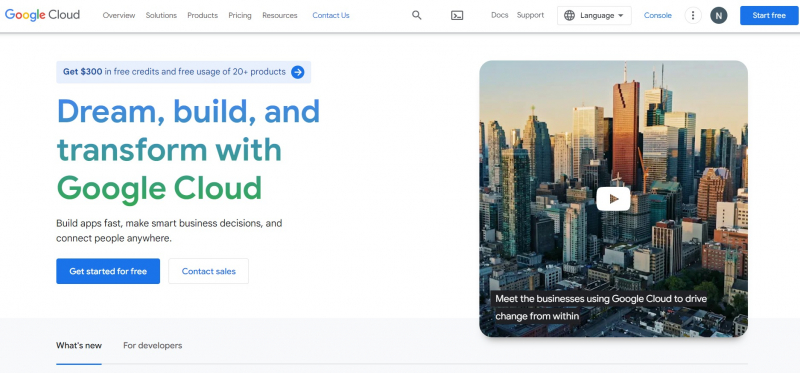
Screenshot via cloud.google.com 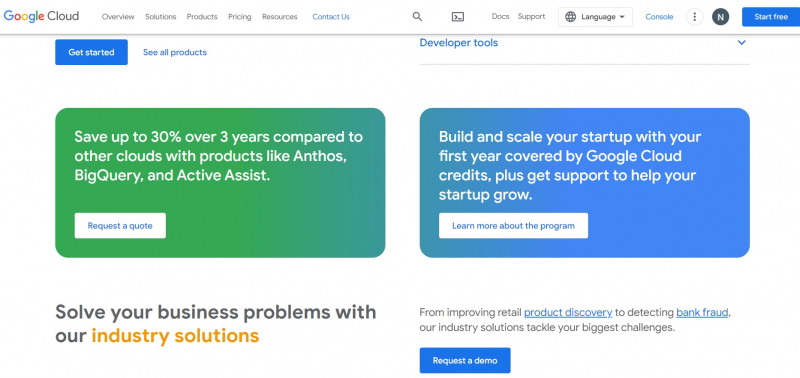
Screenshot via cloud.google.com -
IBM Cloud Computing ranks 6th on the list of the largest cloud computing companies in the US by revenue. IBM offers a range of cloud computing services for organizations through its information technology firm. IBM has three cloud computing hardware platforms in operation. These platforms include virtualization. IBM also provides Websphere, a virtualization application infrastructure that supports virtualization programming models and open standards.
The IBM Tivoli middleware is part of the management layer of the IBM cloud platform. Management systems enable image regulation through automatic provisioning and de-provisioning, as well as monitoring operations and meter use while recording expenditures and assigning payment to the user. The framework's final layer includes integrated workload tools.
Workloads (in the context of cloud computing) are services or instances of code that can be executed to meet specific business demands. IBM also offers solutions for cloud-based collaboration, development, and testing; application development; analytics; business-to-business connectivity; and security.
Founded: 2005
Headquarters: New York, US
Official website: https://www.ibm.com/cloud
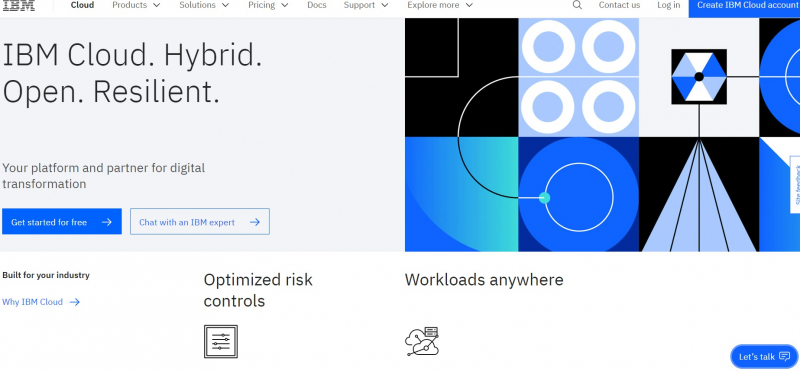
Screenshot via ibm.com 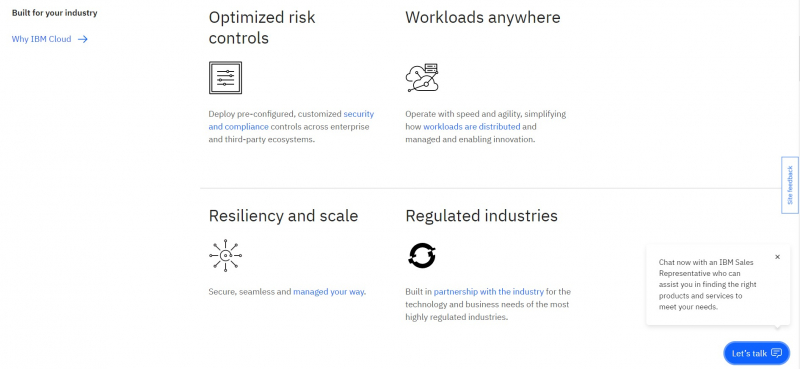
Screenshot via ibm.com -
HP Cloud was a set of cloud computing services provided by Hewlett-Packard that included public cloud, private cloud, hybrid cloud, managed private cloud, and other cloud services. It was formed by the merger of the old HP Converged Cloud business unit and HP Cloud Services, an OpenStack-based public cloud.
From about 2011 to 2016, it was sold to enterprises as a way to connect public cloud services with internal IT resources to build hybrid clouds, or a combination of private and public cloud environments.
Companies that want to use cloud computing have two options: a private cloud, which is a cloud infrastructure built specifically for a single organization or by a third party, or a public cloud, in which a service provider makes applications, storage, and other resources available to the general public.
The choice is dependent on a number of considerations, such as whether the company operates in a highly regulated industry or if the business, such as a web application developer, must deliver services to the market quickly. The first would choose a private cloud for security and peace of mind, whereas the web developer would go with a public cloud option. Most businesses would use a hybrid cloud delivery model, which combines the best of both worlds.
Found: 2010
Headquarters: California, USOfficial website: https://www.hpe.com/us/en/home.html
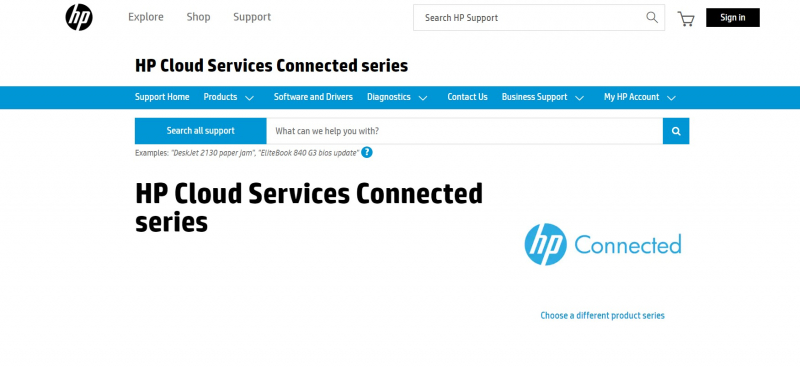
Screenshot via hp.com 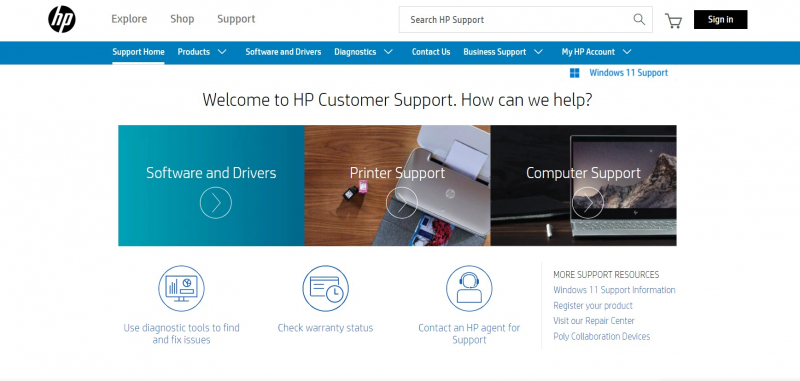
Screenshot via hp.com -
SAP Cloud Platform (SCP) is a platform as a service established by SAP SE for developing new applications or extending existing ones in a secure cloud computing environment managed by SAP. The SAP Cloud Platform combines data and business operations.
SAP Cloud Platform was an open platform-as-a-service that included the in-memory SAP HANA database management system, connected to both on-premises and cloud-based systems running SAP or other third-party software, and relied on open standards for integration options such as Java, JavaScript, Node.js, and Cloud Foundry.
SAP and Apple Inc. collaborated to create iOS mobile apps utilizing cloud-based software development kits (SDKs) for the SAP Cloud Platform. SAP Cloud Platform is built on open-source technology and is developed and supported in collaboration with SUSE. The company collaborated with the Cloud Foundry Foundation on an SAP Cloud Platform service that allowed clients to test and provide feedback on the Cloud Foundry functionality.
Found: 2012
Headquarters: Walldorf, GermanyOfficial website: https://www.sap.com/products/technology-platform/hana.html
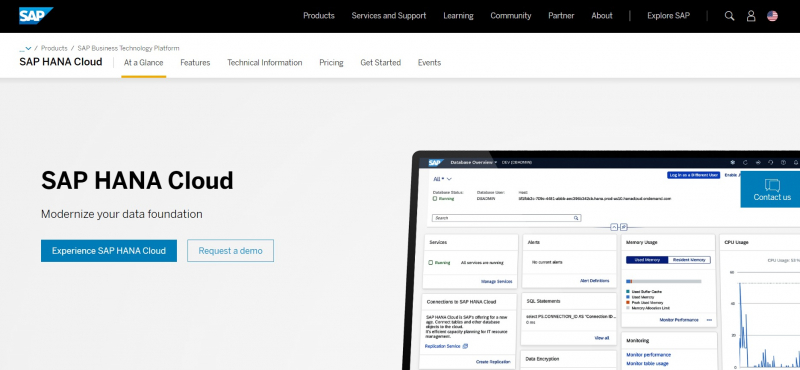
Screenshot via sap.com 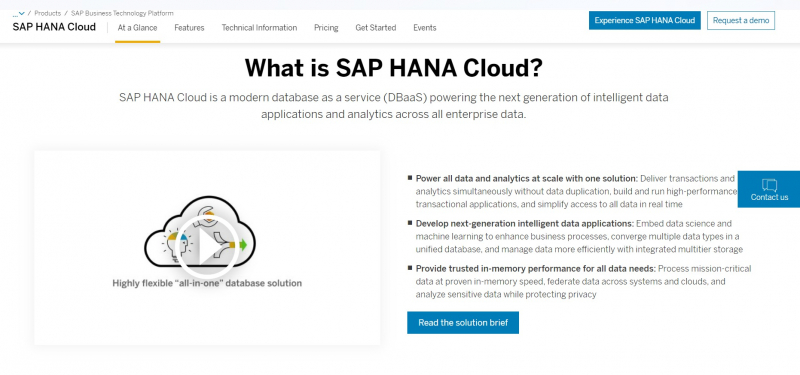
Screenshot via sap.com -
HashiCorp, based in San Francisco, California, is a software company with a freemium business strategy. HashiCorp is best known as the cloud toolbox, providing a wide range of solutions that have propelled it to the forefront of cloud infrastructure management. Its technologies are intended to assist enterprises in more efficiently, securely, and cost-effectively managing their cloud infrastructure.
Mitchell Hashimoto and Armon Dadgar launched the company in 2012. HashiCorp is based in San Francisco, although its personnel are spread around the United States, Canada, Australia, India, and Europe. HashiCorp provides both open-source and private products.
HashiCorp offers a collection of open-source tools to aid in the creation and deployment of large-scale service-oriented software deployments. Each tool is geared towards specific stages of a software application's life cycle, with an emphasis on automation.
Many are built using a plugin-oriented architecture to allow for integration with third-party technologies and services. Commercially available proprietary features for several of these products are aimed at enterprise customers.
Found: 2012
Headquarters: California, USOfficial website: https://hashicorp.com/
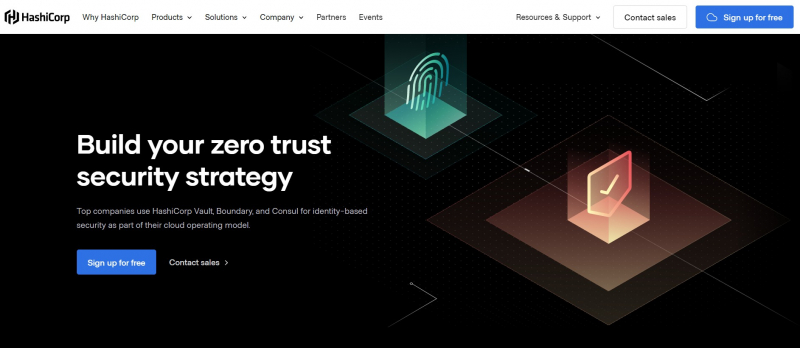
Screenshot via hashicorp.com 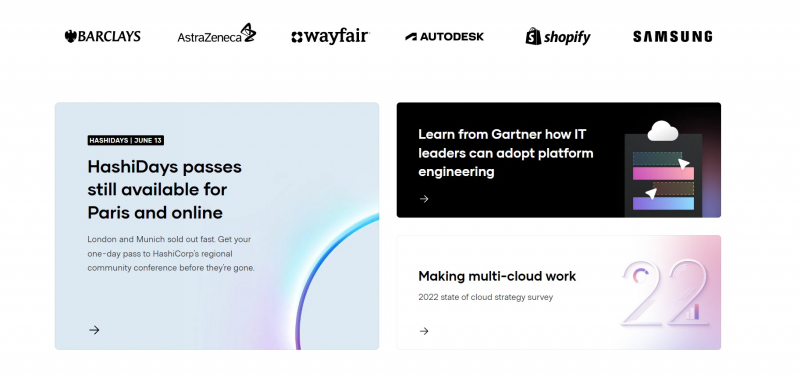
Screenshot via hashicorp.com -
Rackspace Technology, Inc. is an American cloud computing firm headquartered in Windcrest, Texas, a San Antonio suburb. In addition to Blacksburg, Virginia, and Austin, Texas, the corporation maintains offices in Australia, Canada, the United Kingdom, India, Dubai, Switzerland, the Netherlands, Germany, Singapore, Mexico, and Hong Kong. Cloud Files, Cloud Block Storage, and Cloud Backup are all part of the Rackspace Cloud.
Cloud Files, which was introduced in 2008, takes advantage of OpenStack Swift object storage. People connect to it via the REST application programming interface (API). Rackspace Cloud Files uses a usage-based pricing approach. Clients are charged for storage usage as well as incoming bandwidth, but not for outbound bandwidth or maintenance. The platform also includes fundamental features like replication, guaranteed uptime, and mobile access. Customers can manage their cloud usage through an online control panel, desktop software, or a variety of third-party products that link to the Cloud Files API.
Rackspace also provides cloud block storage and cloud backup services. Cloud Block Storage, which was released in 2012 and competes with Amazon Elastic Block Store, is powered by OpenStack. It uses a combination of hard drives and solid-state drives to provide higher performance than object-based clouds. Rackspace Cloud Backup offers file-level backups while reducing storage costs and improving security through compression, deduplication, and encryption.
Founded: 1998
Headquarters: Windcrest, Texas, US
Official website: https://www.rackspace.com/cloud
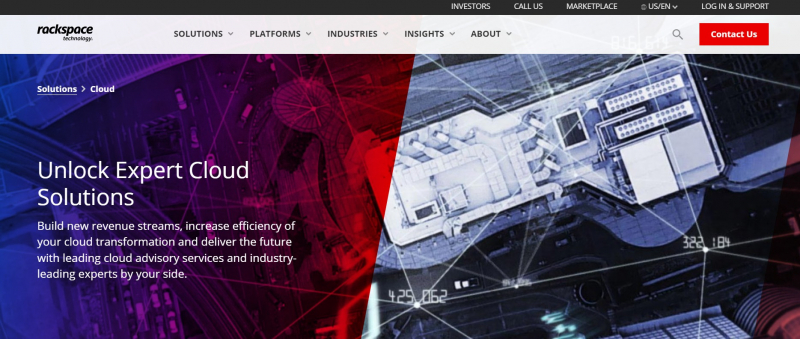
Screenshot via rackspace.com 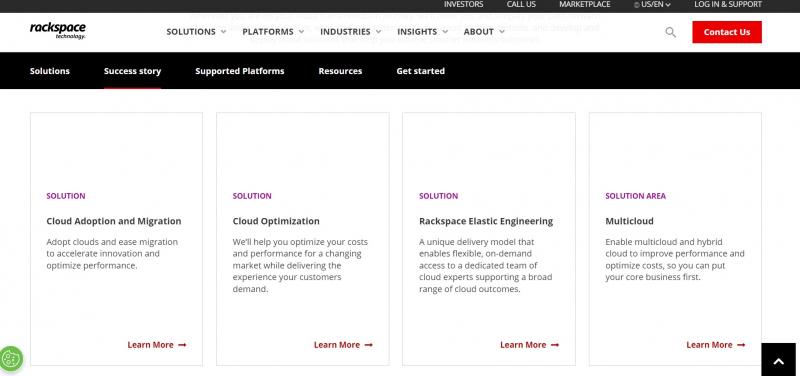
Screenshot via rackspace.com















